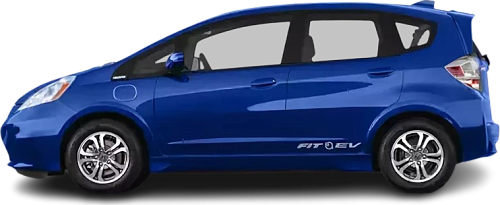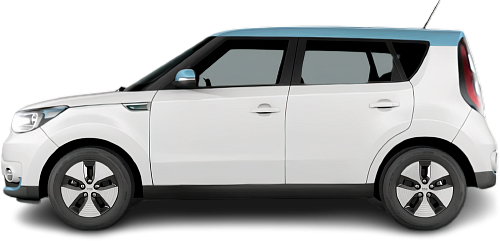Global EV Comparison: Honda Fit EV Gen 1 vs Kia Soul EV Gen 1
Struggling to Decide? Let AI Help!
Your AI Summary Is Ready!
General Info
Since both vehicles have been discontinued, they are now only available on the used car market. You can get the Kia Soul EV (2014-2017) for as low as €8799, while the Honda Fit EV (2013-2015) was never offered for sale in Europe.
The Honda Fit EV (2013-2015) is a Hatchback, whereas the Kia Soul EV (2014-2017) is a SUV.
| Property | Honda Fit EV Gen 1 | Kia Soul EV Gen 1 |
|---|---|---|
| Years of Production | 2013-2015 | 2014-2017 |
| Current Status | Discontinued | Discontinued |
| Country of Manufacture | USA | South Korea |
| Body Style | Hatchback | SUV |
| Market Availability | USA | EU, USA |
| Price Europe (Used) | - Price Europe (Used) | €8799 |
| GCC Score | 3.9 | 4.5 |
Range and Efficiency
While the Kia Soul EV (2014-2017) offers a longer real-world range and a bigger battery, it is less energy-efficient than the Honda Fit EV (2013-2015).
| Property | Honda Fit EV Gen 1 | Kia Soul EV Gen 1 |
|---|---|---|
| Range (EPA) | 132 km | 150 km |
| Range (GCC) | 125 km | 151 km |
| Battery Capacity (Nominal) | 20 kWh | 30.5 kWh |
| Battery Capacity (Usable) | 19 kWh | 27 kWh |
| Efficiency per 100 km | 15.2 kWh/100 km | 17.9 kWh/100 km |
| Efficiency per kWh | 6.58 km/kWh | 5.59 km/kWh |
| Range and Efficiency Score | 5.4 | 4.6 |
Charging
Both vehicles utilize a standard 400-volt architecture.
The Honda Fit EV (2013-2015) has no DC fast charging capability, whereas the Kia Soul EV (2014-2017) can charge at up to 50 kW.
The Honda Fit EV (2013-2015) features a more powerful on-board charger, supporting a maximum AC charging power of 6.6 kW, whereas the Kia Soul EV (2014-2017) is limited to 3.6 kW.
| Property | Honda Fit EV Gen 1 | Kia Soul EV Gen 1 |
|---|---|---|
| Max Charging Power (AC) | 6.6 kW | 3.6 kW |
| Max Charging Power (DC) | - Max Charging Power (DC) | 50 kW |
| Architecture | 400 V | 400 V |
| Charge Port | Type 1 (J1772) | CHAdeMO |
| Charging Score | 2.7 | 3.2 |
Performance
Both vehicles are front-wheel drive.
The Honda Fit EV (2013-2015) boasts greater motor power and accelerates faster from 0 to 100 km/h.
| Property | Honda Fit EV Gen 1 | Kia Soul EV Gen 1 |
|---|---|---|
| Drive Type | FWD | FWD |
| Motor Type | PMSM | PMSM |
| Motor Power (kW) | 92 kW | 81 kW |
| Motor Power (hp) | 123 hp | 109 hp |
| Motor Torque | 256 Nm | 285 Nm |
| 0-100 km/h | 8.4 s | 11.2 s |
| Top Speed | 140 km/h | 145 km/h |
| Performance Score | 2.7 | 2.4 |
Dimensions
The Kia Soul EV (2014-2017) boasts a more extended wheelbase.
| Property | Honda Fit EV Gen 1 | Kia Soul EV Gen 1 |
|---|---|---|
| Length | 4105 mm | 4140 mm |
| Width (with Mirrors) | 1694 mm | - Width (with Mirrors) |
| Width (w/o Mirrors) | - Width (w/o Mirrors) | 1800 mm |
| Height | 1524 mm | 1593 mm |
| Wheelbase | 2499 mm | 2570 mm |
Cargo and Towing
Neither car is equipped with a frunk (front trunk).
Neither vehicle is officially rated for towing in in the EU.
| Property | Honda Fit EV Gen 1 | Kia Soul EV Gen 1 |
|---|---|---|
| Number of Seats | 5 | 5 |
| Curb Weight | 1475 kg | 1492 kg |
| Cargo Volume (Trunk) | 340 l | 281 l |
| Cargo Volume (Max) | - Cargo Volume (Max) | 891 l |
| Cargo Volume (Frunk) | - Cargo Volume (Frunk) | - Cargo Volume (Frunk) |
| Towing Capacity | - Towing Capacity | - Towing Capacity |
| Cargo and Towing Score | 4 | 5.4 |




